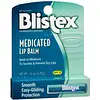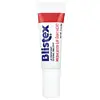What's inside
What's inside
 Key Ingredients
Key Ingredients

 Benefits
Benefits

No benefits
 Concerns
Concerns

 Ingredients Side-by-side
Ingredients Side-by-side

Dimethicone 2%
EmollientEthylhexyl Methoxycinnamate 6.6%
UV AbsorberEthylhexyl Salicylate 4.4%
UV AbsorberBeeswax
Emulsion StabilisingCamphor
MaskingCetyl Alcohol
EmollientCetyl Palmitate
EmollientEuphorbia Cerifera Wax
Aroma
Isopropyl Myristate
EmollientLanolin
EmollientLanolin Oil
EmollientMenthol
MaskingMethyl Salicylate
PerfumingParaffinum Liquidum
EmollientOzokerite
Emulsion StabilisingParaffin
PerfumingPetrolatum
EmollientPhenoxyethanol
PreservativePolybutene
CI 15850
Cosmetic ColorantTheobroma Cacao Seed Butter
EmollientTitanium Dioxide
Cosmetic ColorantDimethicone 2%, Ethylhexyl Methoxycinnamate 6.6%, Ethylhexyl Salicylate 4.4%, Beeswax, Camphor, Cetyl Alcohol, Cetyl Palmitate, Euphorbia Cerifera Wax, Aroma, Isopropyl Myristate, Lanolin, Lanolin Oil, Menthol, Methyl Salicylate, Paraffinum Liquidum, Ozokerite, Paraffin, Petrolatum, Phenoxyethanol, Polybutene, CI 15850, Theobroma Cacao Seed Butter, Titanium Dioxide
Camphor 0.5%
MaskingDimethicone 1.1%
EmollientMenthol 0.625%
MaskingPhenol 0.5%
AntimicrobialAllantoin
Skin ConditioningAmmonium Hydroxide
BufferingBeeswax
Emulsion StabilisingCalcium Disodium EDTA
Calcium Hydroxide
BufferingCetyl Alcohol
EmollientAroma
Glycerin
HumectantHydrated Silica
AbrasiveLanolin
EmollientLauric Acid
CleansingParaffinum Liquidum
EmollientMyristic Acid
CleansingOleic Acid
EmollientPalmitic Acid
EmollientParaffin
PerfumingPetrolatum
EmollientPolyglyceryl-3 Diisostearate
EmulsifyingPotassium Hydroxide
BufferingWater
Skin ConditioningSd Alcohol 36
AstringentSodium Hydroxide
BufferingSodium Saccharin
MaskingStearyl Alcohol
EmollientCamphor 0.5%, Dimethicone 1.1%, Menthol 0.625%, Phenol 0.5%, Allantoin, Ammonium Hydroxide, Beeswax, Calcium Disodium EDTA, Calcium Hydroxide, Cetyl Alcohol, Aroma, Glycerin, Hydrated Silica, Lanolin, Lauric Acid, Paraffinum Liquidum, Myristic Acid, Oleic Acid, Palmitic Acid, Paraffin, Petrolatum, Polyglyceryl-3 Diisostearate, Potassium Hydroxide, Water, Sd Alcohol 36, Sodium Hydroxide, Sodium Saccharin, Stearyl Alcohol
 Reviews
Reviews

Ingredients Explained
These ingredients are found in both products.
Ingredients higher up in an ingredient list are typically present in a larger amount.
Aroma refers to an ingredient, or mixture of ingredients, that impart or mask a flavor.
The name is slightly confusing. This is because INCI associates aroma with flavor instead of smell.
Here is the official definition from the The International Cosmetic Ingredient Dictionary and Handbook:
“Aroma is a term for ingredient labeling used to identify that a product contains a material or combination of materials normally added to a cosmetic to produce or to mask a particular flavor.”
INCI shows the only purpose of aroma to be "flavouring".
However, due to regulation differences, some companies may use aroma in place of parfum.
In Canada, this ingredient only has to be listed in concentrations above 1%.
Learn more about AromaBeeswax is natural wax produced by honey bees and can be synthetically created. It consists mainly of fatty acid esters and long-chain alcohols.
In cosmetics, beeswax is a emollient. Due to its waxy structure, it creates a protective barrier. This barrier prevents water from evaporating off the skin.
This may not be a good ingredient for oily skin. We recommend speaking with a professional if you have concerns.
Beeswax cannot be removed with water, but can be taken off with an oil cleanser.
Beeswax is also antiseptic and contains vitamin A.
Learn more about BeeswaxCamphor is a waxy solid with a strong scent. It is made using turpentine oil.
This ingredient is used for medicinal purposes due to its cooling effect. In medicine, camphor is a common anti-inflammation ingredient.
Camphor also possesses antibacterial and antifungal properties.
One study found camphor to be a potential anti-wrinkle ingredient. This might be due to its ability to increase elastin and collagen production. Collagen and elastin are responsible for plump and youthful looking skin.
It is best to use cosmetics with a small amount of camphor under 11%. Using topical camphor may induce irritation and redness.
In the past, camphor was traditionally made by distilling the wood of the camphor tree.
Learn more about CamphorCetyl Alcohol is a fatty alcohol. Fatty Alcohols are most often used as an emollient or to thicken a product.
Its main roles are:
Though it has "alcohol" in the name, it is not related to denatured alcohol or ethyl alcohol.
The FDA allows products labeled "alcohol-free" to have fatty alcohols.
Learn more about Cetyl AlcoholDimethicone is a type of synthetic silicone created from natural materials such as quartz.
What it does:
Dimethicone comes in different viscosities:
Depending on the viscosity, dimethicone has different properties.
Ingredients lists don't always show which type is used, so we recommend reaching out to the brand if you have questions about the viscosity.
This ingredient is unlikely to cause irritation because it does not get absorbed into skin. However, people with silicone allergies should be careful about using this ingredient.
Note: Dimethicone may contribute to pilling. This is because it is not oil or water soluble, so pilling may occur when layered with products. When mixed with heavy oils in a formula, the outcome is also quite greasy.
Learn more about DimethiconeLanolin is a wax secreted by animals with wool, such as sheep. It is a waterproof emollient.
Emollients help soften and moisturize the skin by creating a film. This film prevents moisture from escaping, helping the skin stay hydrated.
Unlike true fats, lanolin contains sterol esters instead of glycerides. It also contains fatty acids and alcohols.
Because lanolin comes from an animal, it is not considered vegan. Sheep secrete lanolin through sebaceous glands to help protect their skin from the environment.
The answer to this question depends on the brand itself. Being cruelty-free means a brand does not experiment or harm animals. We recommend looking into how brands source their lanolin. Lanolin is cruelty-free if it is gathered without harming the animal.
Learn more about LanolinMenthol is a compound found in mint plants, such as peppermint. In its pure form, it is a clear crystalline substance.
Menthol is known for its cooling sensation; however, the cooling is actually from your skin being sensitized. Menthol can worsen rosacea. We recommend speaking with a professional if you have concerns.
Menthol also has antimicrobial properties.
Learn more about MentholParaffin is a solid created from petroleum. The term 'paraffin' can also refer to either
petroleum jelly or mineral oil.
It has natural occlusive properties which can worsen oily skin. Due to its petrolatum base, this ingredient is not fungal-acne safe.
Paraffinum Liquidum is also known as liquid paraffin. It is a type of highly refined mineral oil.
Like other oils, Paraffinum Liquidum has emollient properties. Emollients help soothe and soften the skin. By creating a barrier to trap moisture within, emollients help keep your skin hydrated.
Paraffinum Liquidum does not irritate the skin and is non-comedogenic.
Learn more about Paraffinum LiquidumPetrolatum is more commonly known as petroleum jelly. It is created by mixing waxes and mineral oils.
This ingredient is effective at reducing water loss by 99%. This is because it is an occlusive. Occlusives create a hydrophobic barrier on the skin to prevent evaporation. This property makes it great for hydrating dry skin.
Pro tip: Use occlusives, such as this ingredient, on damp skin for the best results.
The quality or origin of petrolatum is only known when disclosed by the brand. Most cosmetic petrolatum has gone through several purification stages.
Another benefit of occlusives is it protects your skin against infection or allergies.
Petrolatum may not be safe for fungal-acne. Studies show mineral oil / petroleum leads to the growth of M. Furfur, a type of yeast.
Learn more about Petrolatum